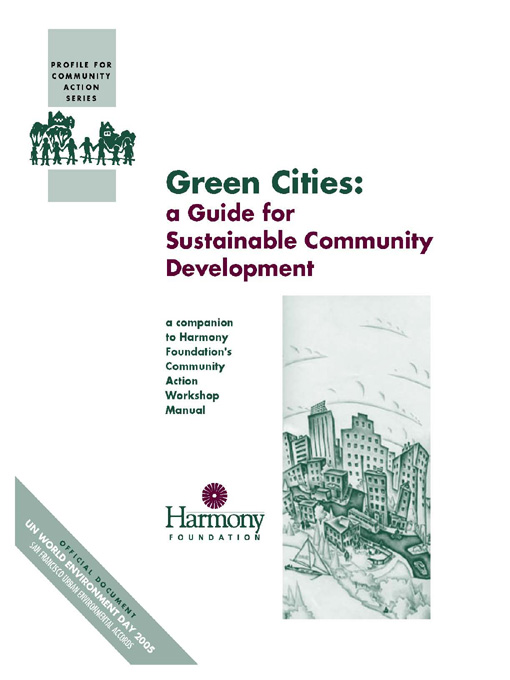"What if communities around the world committed to development based on sound environmental practices and progressive social programs, to reduce waste and green house gases, improve air quality and public transit, conserve water and energy, increase green space, adopt environmentally sound planning and purchasing and support healthy food production with active public participation?" -Michael Bloomfield Executive Director, Harmony Foundation
An exciting transformation is underway in neighborhoods around the world. Citizens and governments are taking action in their cities and towns and across national boundaries to protect the environment, address poverty and other social issues, and improve the quality of life now and for the future. Communities are discovering that when residents, local governments, city building professionals and business work together, destructive patterns of development can be transformed into beneficial outcomes that provide prosperity that is ecologically and socially sustainable.
Today, 49% of the world's population, or some 3.6 billion people, live in cities. By 2030, the figure is expected to rise to 61%. Large urban settlements face an increasing number of problems: severe environmental degradation, pollution, water, energy and food shortages, solid waste accumulation, housing affordability and availability, disease and poverty.
Green Cities: a Guide to Sustainable Community Development, an official document of United Nation's World Environment Day 2005 and the San Francisco Urban Environmental Accords, is fourth in a series of Harmony Foundation profiles on specific issues. It was created to promote community development initiatives which are environmentally sound and socially just and to encourage public officials, municipal planners and community leaders to exercise visionary leadership and bring people together to take action which meets local needs while addressing regional, national and international objectives. Green Cities offers insights, information and practical actions that illuminate the path towards sustainable community development. It includes a thought-provoking foreword by Maurice Strong, a concise and thorough overview of sustainable community development, inspiring community success stories from around the world and invaluable resources and tools for establishing community priorities and taking local action. Green Cities, a collaboration with The Centre for Sustainable Community Development, Simon Fraser University, Burnaby, British Columbia, encourages a new kind of leadership that understands that success depends on long-term thinking and the active participation of all citizens. It results from a Harmony partnership with the Earth Council Alliance.
"The Green Cities guide is an important and timely contribution to the efforts of Cities around the world to transform urban growth into economic prosperity, social justice and ecological stability." -Charles Kelly, Commissioner General, World Urban Forum 3, Vancouver 2006

